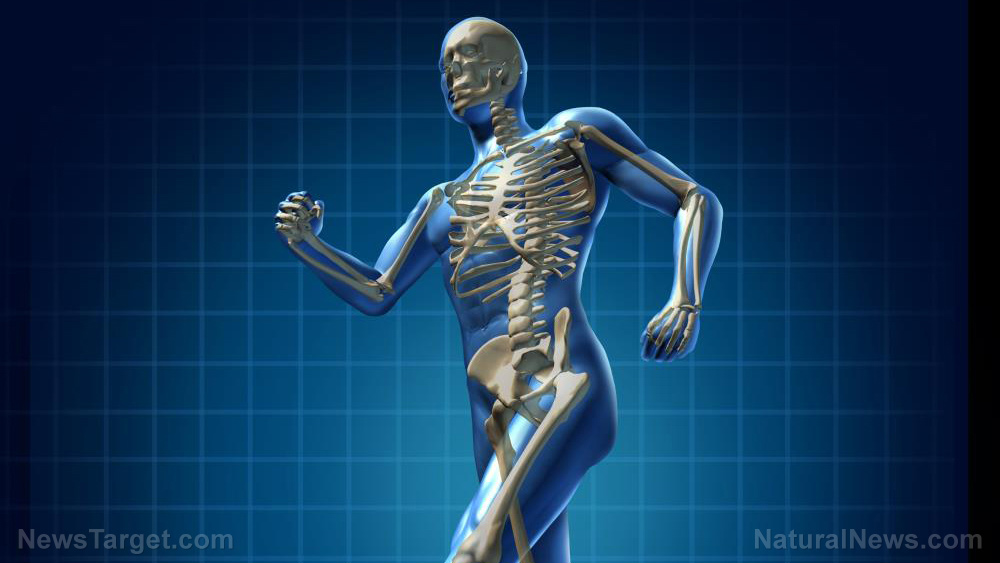25 Health conditions linked to bone loss and osteoporosis: What to do and how they affect bone health
07/29/2020 / By Divina Ramirez

Osteoporosis or “porous bone” is a condition that causes bones to become brittle, raising the risk of falls and fractures that can be fatal in old age.
It is thought that poor calcium intake and eating disorders are the main causes of osteoporosis, but natural health proponent Robert Rister adds that some 25 medical conditions can also bring about bone loss and osteoporosis.
In an article published in SteadyHealth, Rister underscores the importance of detecting these conditions as soon as possible. Doing so can help both patients and healthcare professionals treat the offending disease before it can cause irreparable damage.
Secondary causes of osteoporosis
Certain medical conditions and medications that might not be related to osteoporosis at all can nonetheless cause the disease. This is called secondary osteoporosis, and treating it depends on the immediate detection and proper identification of the underlying cause.
In his article, Rister listed 25 possible causes of osteoporosis. These conditions can be divided into six groups based on the nature of their pathogenesis.
Autoimmune diseases
These conditions cause immune cells to produce antibodies that attack normal tissues. The cells see the tissues as a disease and attempt to fight it, generating inflammation that can damage bone.
- Rheumatoid arthritis – This form of arthritis causes inflammation of the joints. Rheumatoid arthritis patients tend to have a greater risk of hip fractures.
- Multiple sclerosis – This condition affects the brain and spinal cord. Multiple sclerosis patients often lack vitamin D, another essential nutrient for bone health.
- Ankylosing spondylitis – This is a rare form of arthritis that affects the spine. About 25 percent of ankylosing spondylitis patients end up developing arthritis.
- Lupus – Lupus patients experience an abnormal sensitivity to sunlight, causing them to avoid sun exposure. In turn, this often results in vitamin D deficiency.
Diseases or complications due to malabsorption
These conditions can either be a symptom or a byproduct of malabsorption, a clinical term that refers to a difficulty or inability to digest food and absorb nutrients. In effect, malabsorption keeps calcium, an essential mineral for bone health, from reaching the bones.
- Anorexia – Anorexic people don’t get enough nutrients needed to support healthy bones including calcium, magnesium, vitamin D and protein.
- Celiac disease – This serious immune disease can make it difficult for the gut to absorb calcium, magnesium and other important nutrients for bone health.
- Crohn’s disease – This gastrointestinal condition generates inflammation that affects bones.
- Ulcerative colitis – Like Crohn’s disease, this condition also promotes inflammation. It can even disrupt the absorption of vitamin D.
- Liver disease – The liver is involved in mediating bone loss. Therefore, conditions that affect the liver also affect the bones.
- Hepatitis C infection – The hepatitis C virus also promotes inflammation in the liver, thus affecting bone health.
- Gastric bypass surgery – People who had undergone weight-loss surgeries are at a greater risk of osteoporosis because of malnutrition following the procedure.
Iron overload
Excess iron has been found to affect the process of bone formation, resulting in osteoporosis and bone fractures.
- Hereditary hemochromatosis – This is a genetic disorder that causes liver disease and, in turn, osteoporosis.
- Beta-thalassemia – Most thalassemia patients have brittle bones because of the excess iron disrupting bone formation.
Kidney disease
Bone loss is common among kidney disease patients because of the vital role that the kidneys play in keeping calcium inside the bones. Dysfunctional kidneys release excess hormones into the blood that move calcium from inside the bones and into the blood.
- Chronic kidney disease – In chronic kidney disease patients, their kidneys prevent calcium from reaching the bones.
- Idiopathic hypercalciuria – Too much calcium and vitamin D can also lead to brittle bones. This is the case for idiopathic hypercalciuria patients.
Blood-related disorders
Hematological or blood-related disorders are often linked to osteoporosis because blood is a vital basis of bone formation.
- Multiple myeloma – This is a form of blood cancer that affects plasma cells, a type of white blood cell, in the bone marrow.
- Monoclonal gammopathy of uncertain significance – This non-cancerous disease is characterized by the presence of an abnormal protein in the blood. Past studies found that people with this condition have a greater risk of fractures.
- Systemic mastocytosis – This is another blood disorder that places a person at a heightened risk of fractures.
Complications due to medications
Taking medications for certain conditions can also cause side effects that damage bones and lead to osteoporosis. In particular, medications prescribed for certain conditions can interfere with calcium absorption, trigger bone loss and deplete potassium levels – another essential mineral for bone formation:
Conditions whose medicines can lead to osteoporosis include:
- Seizures
- Congestive heart failure
- Esophagitis
- Chronic heartburn
- Acquired immunodeficiency syndrome
- Hepatitis B infection
- Hypercoagulation disorders
On top of these medical conditions, numerous other factors, including smoking, alcohol consumption, poor nutrition and lack of exercise, can contribute to poor bone health and bone loss in later life.
To curb poor bone health and minimize the risk of osteoporosis, eat a balanced diet rich in calcium-rich foods. Exercising on a regular basis also aids in maintaining strong bones and muscles even in old age. (Related: Can acupuncture be used to treat osteoporosis?)
Read more articles about osteoporosis and bone health at NaturalHealth.news.
Sources include:
Tagged Under: arthritis, autoimmune diseases, blood disorder, bone health, bone loss, iron overload, kidney disease, liver disease, malabsorption, osteoporosis
RECENT NEWS & ARTICLES
PharmaceuticalFraud.com is a fact-based public education website published by Pharmaceutical Fraud Features, LLC.
All content copyright © 2018 by Pharmaceutical Fraud Features, LLC.
Contact Us with Tips or Corrections
All trademarks, registered trademarks and servicemarks mentioned on this site are the property of their respective owners.


















